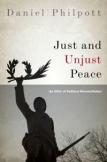July Selection
When historians write the history of the development of our political ideas and institutions this past quarter century, they would be amply justified to label it “an unexpected revolution.” For beginning in the early 1990s, there has been a proliferation of new practices and institutions, even professions: humanitarian interventions, the responsibility to protect, truth and reconciliation commissions, international war tribunals and the international criminal court, to name the most obvious. The old liberal idea of peace as the cessation of conflict, the negotiation of peace agreements, peace monitoring (or peacekeeping) has given way to a more positive conception–and practice–of peace with reconstruction, development, resettlement, trauma care and healing dialogues between victims and offenders. Even the positive conception of peace is bursting at the margins with both practitioners and theorists urging that genuine peacemaking requires more, especially forgiveness and reconciliation.
In a tour de force, Notre Dame political theorist Daniel Philpott has elaborated a rich ethic for reconciliation as the overarching principle of justice that will undergird peace in the emerging international order. The ground-breaking novelty of Philpott’s proposal lies in his starting-point, not a traditional or contemporary theory of justice, but the multiplicity and variety of wounds (injustices) men and women suffer in divided societies and international wars as well as the great variety of practices and institutions that have grown up in recent years to heal them. Much of the book is concerned with responding to alternative and critical views to the reconciliation paradigm; but the most persuasive element in the argument is the inventory of injustice done in conflict and the remedies for them. Only reconciliation, if only partially and gradually, can secure a healing peace.
Philpott argues, moreover, that this ethic coincides with an overlapping consensus between secular and religious (Jewish, Christian and Muslim) traditions on reconciliation making it feasible to gather both popular and elite support in bringing peace to divided societies. Just and Unjust Peace is a book for ethicists, philosophers, lawyers and theologians, but its rigor should not deter peace practitioners and even interested amateurs. It can be read with profit by all, and, one may hope, will contribute to the fulsome peace Philpott holds out for our realization.
Purchase Just and Unjust Peace: An Ethic of Political Reconciliation from amazon.com
This article also appeared in print, under the headline “July Selection,” in the July 16, 2012, issue.








